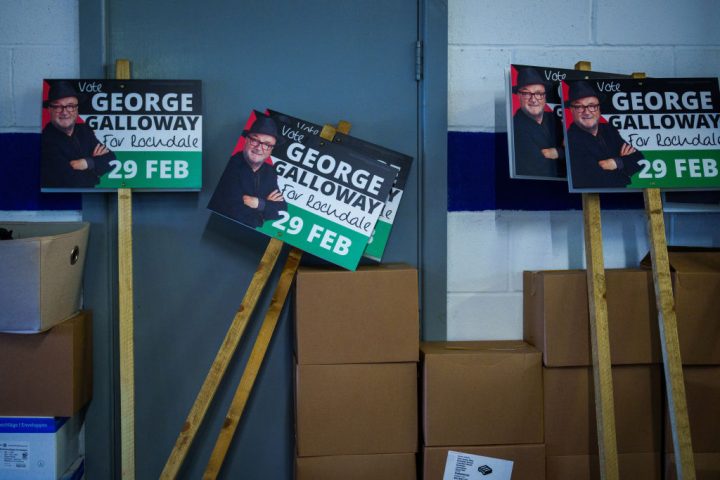If the by-election in Rochdale, one of the poorest constituencies in the country, is about anything other than Gaza, it is about the Labour party. After all, it is being contested by three former members of the faithful who went, each in his own inimitable way, off the rails.
George Galloway, the bookies’ favourite, was booted out of Labour after railing against ‘Tony Blair’s lie machine’ and calling on British troops to disobey orders in Iraq. His subsequent career has burrowed ever deeper into the cesspit of Muslim-adjacent firebrand posturing, expressed in regular appearances on Iranian and Russian state television (and once in the Big Brother House where he pretended to be a cat).
This is the key question that will face all voters in the general election: has Labour truly changed?
Galloway is representing the Workers Party of Britain, which he founded himself, from his centre of operations at a Suzuki dealership near the town centre. In Rochdale, 20 per cent of whose constituents are Muslim, he is campaigning on a platform of a) sticking it to the IDF and b) bringing Primark to town.
Player number two, Simon Danczuk – by far the least sinister of the three principal candidates – was shoved through the Labour trapdoor some years ago for, among other indiscretions, sexting a teenage dominatrix who ‘sold her toenail clippings for £10’. His campaign in Rochdale is built upon his reputation for standing up against the grooming of young girls (he represented the constituency between 2010 and 2017).
In the public imagination, Danczuk has become known principally for his love life. After divorcing his second wife, self-styled ‘selfie queen’ Karen, who is 17 years younger than him – their marriage broke down and it was later reported that he had had sex on his constituency office desk with a 22-year-old whom he had met days before on Twitter – last year he wed Rwandan beauty therapist Claudine Uwamahoro, almost three decades his junior. The pictures, printed in the Daily Mail, were quite the thing. In August, the Home Office denied Uwamahoro a visa as they did not believe they were in a genuine relationship. They relented in September, giving her permission to live and work in the UK for three years. Yesterday, a man was arrested on suspicion of sending Danczuk death threats.
Then there is Azhar Ali, formerly the frontrunner, who was recently dumped by Sir Keir Starmer for claiming that Israel had ‘allowed’ 7 October as a pretext for attacking Gaza and railing against ‘people in the media from certain Jewish quarters’. So fresh is Ali’s defenestration that his name will remain as a Labour candidate on the ballot papers, which had already been printed. Earlier this month, the Jewish Chronicle revealed that Ali was a trustee of a mosque where preachers had voiced support for terrorists and attacked Zionism as the result of ‘totalitarian brainwashing’. He has been keeping a low profile since his defenestration but is still seen as a serious contender.
This is politics by freakshow. Rochdale has one of the highest destitution rates in England, according to the Joseph Rowntree Foundation. Symbolic of its prospects is the moribund Wheatsheaf shopping centre, once a bustling, five-storey mall which shut its doors in the pandemic and never re-opened, becoming a haunted house of dusty mannequins and graffiti. Outside its walls the town is stalked by homelessness, pawn shops and food banks. Yet the biggest campaigning issue is the Jewish fight for survival 3,000 miles away and the election is being contested by clowns.
It is true that Rochdale has never enjoyed the best of fortune when it comes to its political representatives. Cyril Smith, the obese Liberal Democrat paedophile who had a penchant for spanking young boys, represented the constituency for two decades until 1992. It has not had the best of luck in the press, either. The grooming gang scandal continues to cast a long shadow over its reputation, in which many dark things hide.
Nevertheless, the current political ignominy says a great deal about Labour. Sir Keir, who has held his nerve – just – in his support for Israel since 7 October, has done a decent job cleansing the parliamentary party of antisemites and has had some success in extending his authority to the rank-and-file. At Labour conference last year, the Labour Friends of Israel event was buzzing with energy while fringe groups like Jewish Voice for Labour, a relic from the Corbyn years, were remarkably etiolated. He also managed to elbow out Ali without too much prevarication.
Deep problems, however, remain. Each of the three main Rochdale candidates, in their different ways, has continued to see themselves as representative of the true heart of Labour after the leadership rejected them. Since 7 October, it has become clear that a disturbing number of party members share this view.
More than a decade after his expulsion, Galloway said he would rejoin Labour ‘pretty damn quick’ if Corbyn became leader. Speaking on LBC in 2015, he said: ‘I’ve always been a Labour man. I consider myself real Labour. I’ve never been a Marxist or a Trotskyist, or any other kind of ist, other than a Labourist.’ It never happened, of course, for various reasons. But in the same interview he said: ‘I would predict (and let’s hope God spares us both and we can test this), that by 2020, the next general election, a Jeremy Corbyn-led Labour party would have one million members.’ That didn’t happen either.
The fact remains that in Galloway’s shadowy perception of the world, it is the Labour leadership that betrayed him, not the other way round. His own (rather low) centre of gravity, he feels, is that of the Labour movement as a whole. Can we say with full confidence that he is wrong?
Take Azhar Ali. He tried to cling onto the party’s coat-tails with a halfhearted apology before fresh evidence did for him. Finding himself out in the cold, he turned his guns on his former leader. Supporters released a picture of him against the background of a green Big Ben, accompanied by the slogan: ‘Sacked by Starmer for speaking on Palestine. It’s time to teach Starmer a lesson in Rochdale. Vote Azhar Ali.’ The message was clear: Labour has betrayed its base.
This is the monster that was unleashed by Ed Miliband, who changed the rules to allow the hard left a route to disruption and power. For years, a radical candidate was fielded ritualistically in every party leadership election as a grudging nod to the party’s Marxist-Leninist fringe. Miliband’s rule changes, which allowed anybody a vote for the price of £3, removed the symbolism from the symbol, allowing Corbyn to sweep to real-world power. This unleashed seismic changes which have yet to be fully reversed.
During the Corbyn years, Labour’s support became increasingly built on cranks. Despite coming very close to Downing Street in 2017, ultimately there were not enough cranks in Britain to get him over the line. But amid the radicalising effect of the war in Gaza, which is polarising domestic politics as potently as international dynamics, the dark red monster has its claws around Starmer’s ankles.
This is the key question that will face all voters in the general election: has Labour truly changed? The party is dramatically divided, not on the basis of Brexit or immigration but something more fundamental: the line between morality and depravity. However dysfunctional the Tories and however professional the Starmer operation, the dilemma could not be more serious. Will Britain really offer the keys to No. 10 to a party that is part friend, part foe?
Clarification: This article has been changed to reflect that Mr Danczuk’s marriage had already broken down when he met the 22-year old referred to in the article.







Comments